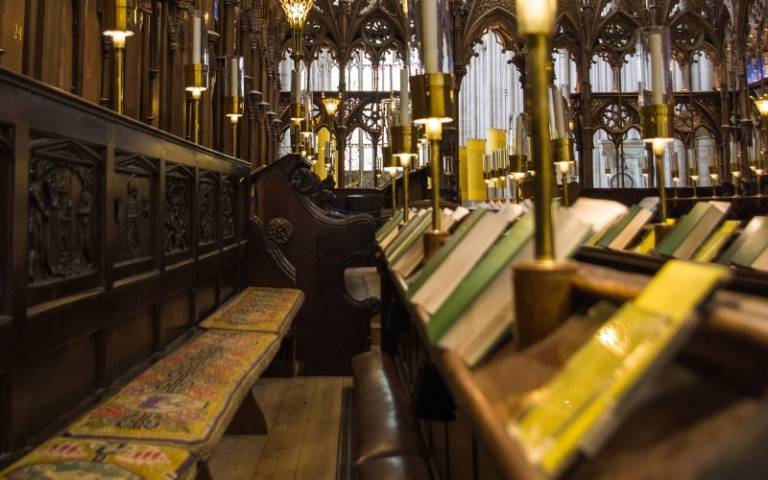Singing and worship the focus of new Covid-19 study
5 October 2020
Religious and faith followers are being invited to take part in a new UCL study, which aims to understand how the practice of worship has changed during Covid-19.

Researchers will also ask a subset of participants to sing, chant or hum as part of an aerosol droplet test, to establish the risk of transmitting Covid-19 when singing hymns or prayers in a place of worship or similar faith setting.
At the moment the government in England has placed a number of restrictions on traditional worship activities, which means there are certain limits on numbers allowed in congregations.
In regards singing the guidance* states it should be "limited to the performers, and worship should not include congregational singing".
It continues: "People should avoid singing, shouting and raising voices. This is because of the potential for increased risk of transmission from aerosol and droplets."
Moving forward, the research team believes the study’s results could help shape any future update to the government’s Covid-19 policy around communal worship and singing.
Study lead, Professor Laurence Lovat (UCL Surgery & Interventional Science) said: “Places of worship play an important role in society, providing both spiritual guidance and expression, and bringing communities together.
“Unfortunately the Covid-19 pandemic has significantly changed many people’s daily or weekly worshipping routines, affecting their ability to pray, enjoy group discussion or take part in singing or chanting.
“Our study aims to establish how the practice of worship has changed and find out what the risk of Covid-19 transmission is when singing, chanting or humming with or without a face mask. We want to produce information to help shape government policy for religious worship.”
There are two parts to the COvid aNd FacE MaSkS (CONFESS) study.
- An online questionnaire, to establish how important religion or faith is to the participant, whether they changed their worshipping practice due to the Covid-19 pandemic, the level of understanding of Covidrestrictions placed on communal services, and any change in mood or wellbeing.
- An aerosol droplet test: Working with experts at UCL engineering, researchers will ask around 50 people from London to take part in an experiment designed to establish the spread of aerosol droplets caused by singing, with or without a mask. Each participant will stand in front of a high-speed camera and a bright laser light and either sing, chant, hum or speak to see how many droplets are produced.
Hywel Davies (UCL Mechanical Engineering), the PhD student who will run the experiments, said: “We hope to characterise aerosol droplets produced by a wide array of individuals and observe how effectively face masks inhibit the flow and number of droplets being emitted. This may allow us to understand how safe choirs or other gatherings are during the pandemic and how to increase their safety.”
Researchers at UCL would like to recruit up to 3000 people to the CONFESS study, which will run until the end of 2020. Anyone interested in taking part can access the study here: CONFESS study.
*UK Government: COVID-19: guidance for the safe use of places of worship during the pandemic
Links
- Professor Laurence Lovat's academic profile
- Hywel Davies' academic profile
- UCL Surgery and Interventional Science
- UCL Mechanical Engineering
Image
- ‘cathedral, Winchester, nave’ credit sweetaholic on Pixabay CC BY 2.0
Media contact
Henry Killworth
Tel: +44 (0) 7881 833274
E: h.killworth [at] ucl.ac.uk
 Close
Close

